Unit 3 Conservation Lesson 1 The Sixth Extinction (Reading)课件(共38张,内嵌视频)-高中英语北师大版(2019)选择性必修第一册(共39页
文档属性
| 名称 | Unit 3 Conservation Lesson 1 The Sixth Extinction (Reading)课件(共38张,内嵌视频)-高中英语北师大版(2019)选择性必修第一册(共39页 | 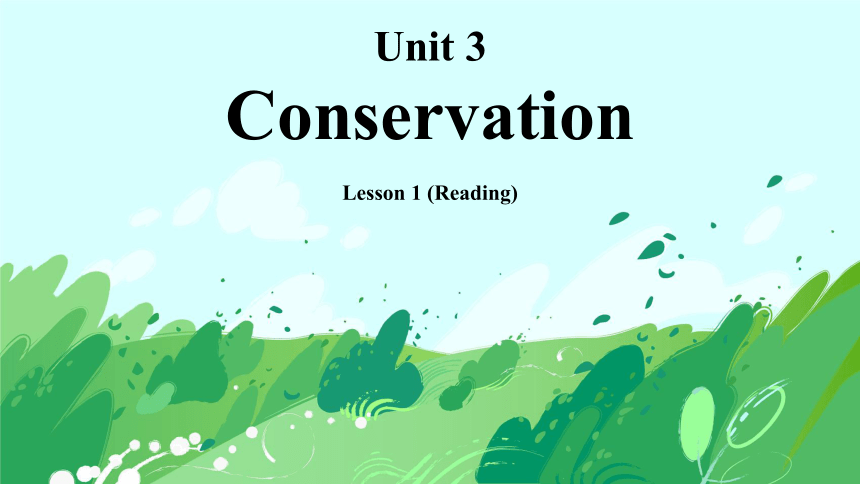 | |
| 格式 | pptx | ||
| 文件大小 | 35.4MB | ||
| 资源类型 | 教案 | ||
| 版本资源 | 北师大版(2019) | ||
| 科目 | 英语 | ||
| 更新时间 | 2025-08-01 10:15:18 | ||
图片预览

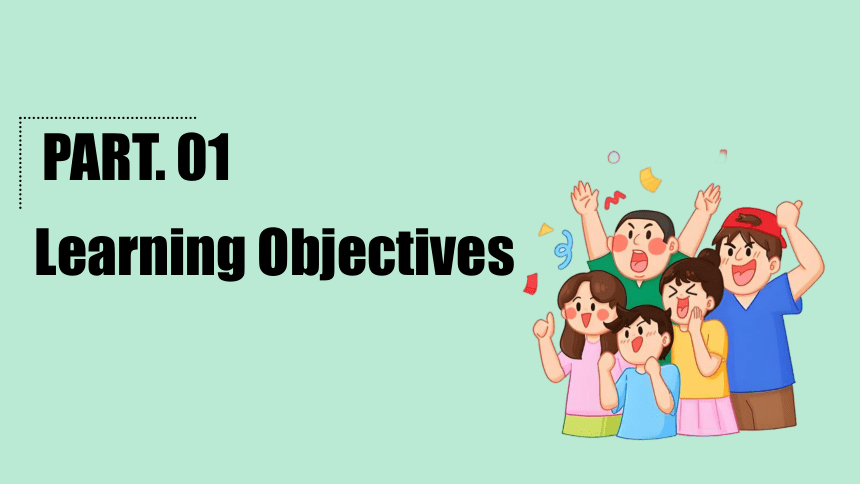
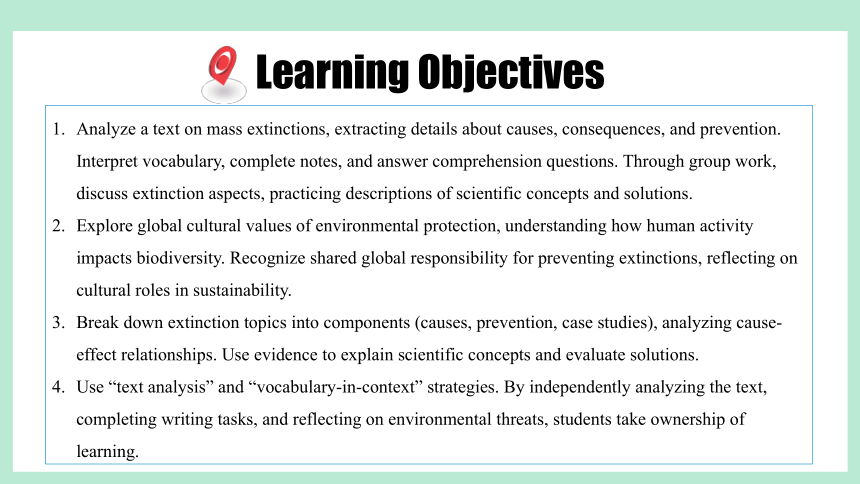
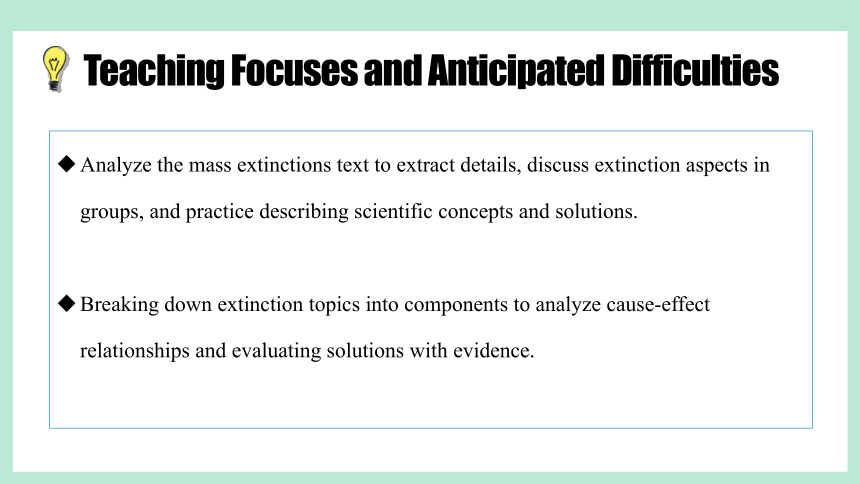

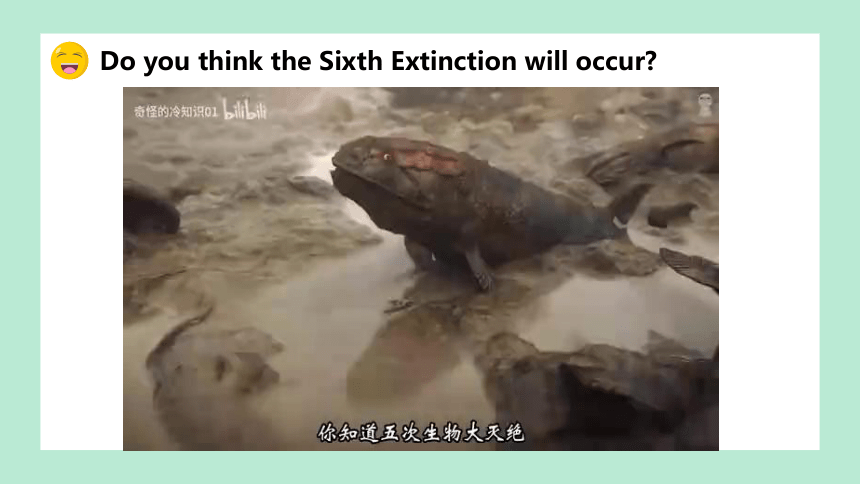
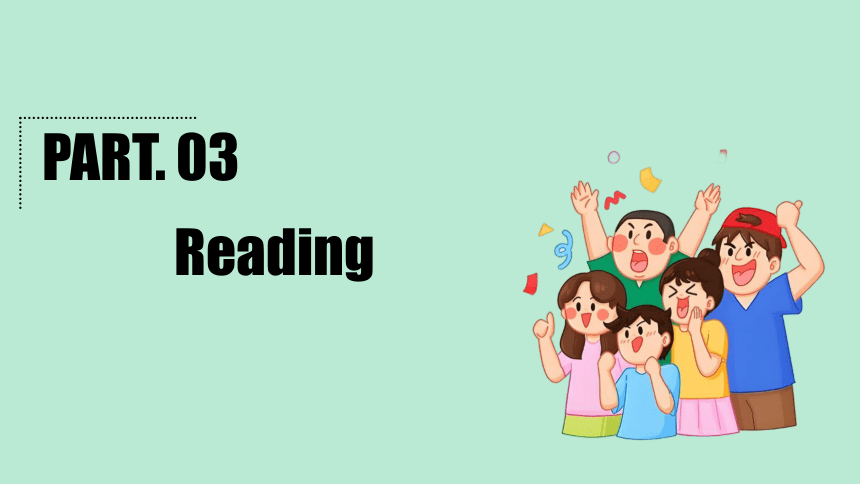
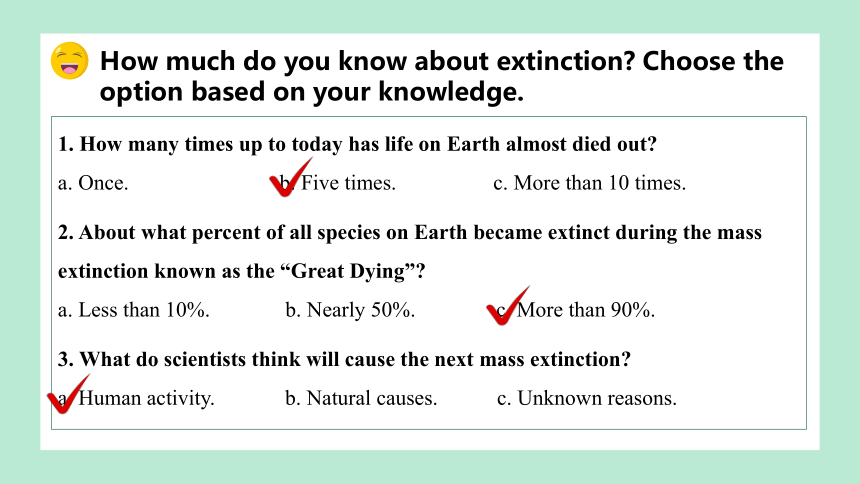
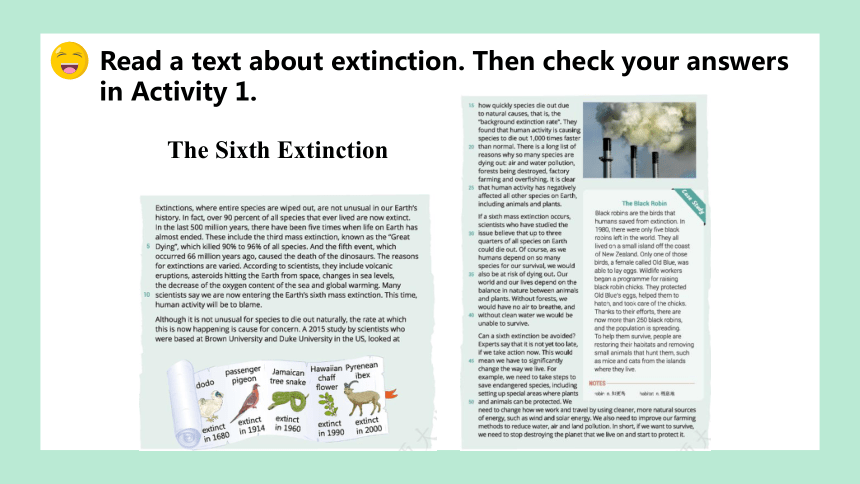
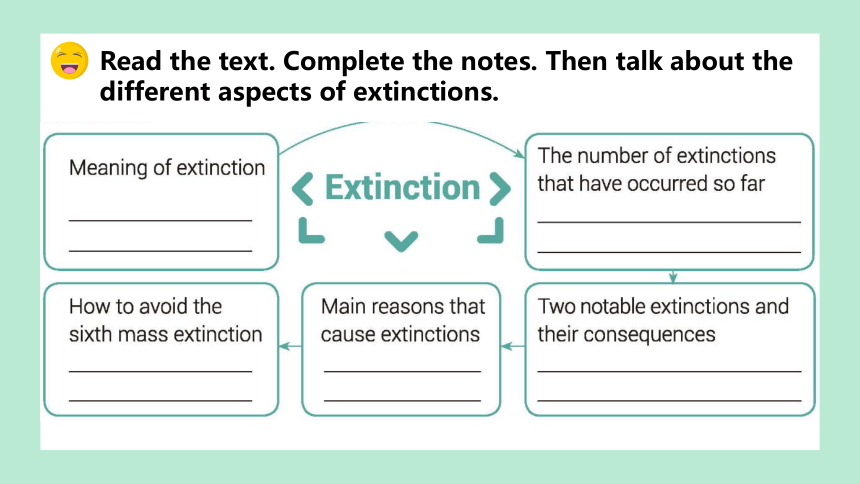
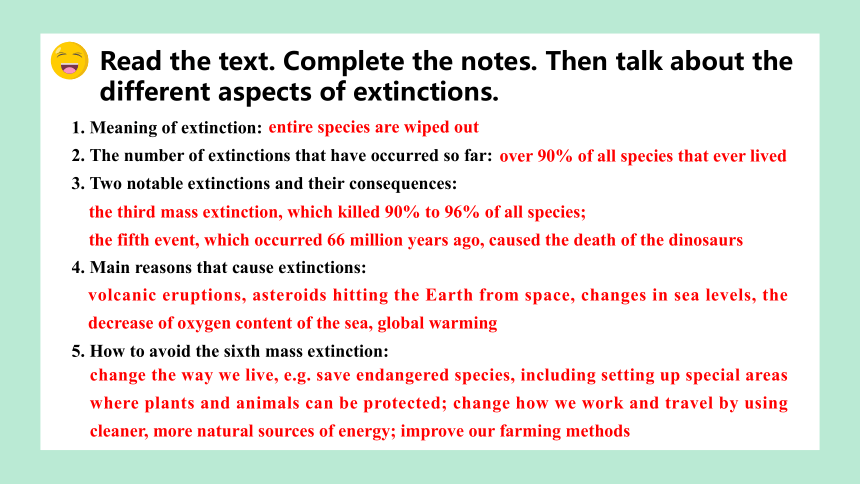
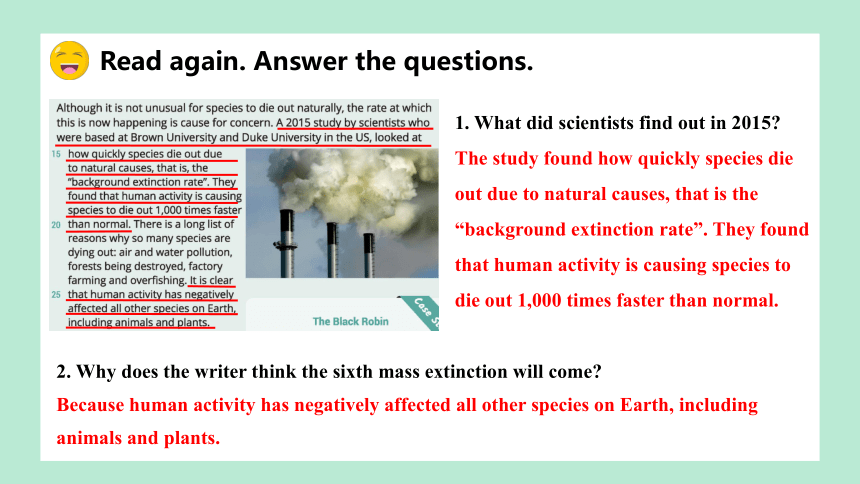
文档简介
(共38张PPT)
Lesson 1 (Reading)
Unit 3
Conservation
Learning Objectives
PART. 01
Understand the daily study and life of British middle school students by watching videos. Based on your own daily study and life, compare the study and life in Chinese and British schools, and find out the similarities and differences between the two. Talk about your first impression of high school life, and have a preliminary perception of the study and life in the senior high school stage.
Learning Objectives
Analyze a text on mass extinctions, extracting details about causes, consequences, and prevention. Interpret vocabulary, complete notes, and answer comprehension questions. Through group work, discuss extinction aspects, practicing descriptions of scientific concepts and solutions.
Explore global cultural values of environmental protection, understanding how human activity impacts biodiversity. Recognize shared global responsibility for preventing extinctions, reflecting on cultural roles in sustainability.
Break down extinction topics into components (causes, prevention, case studies), analyzing cause-effect relationships. Use evidence to explain scientific concepts and evaluate solutions.
Use “text analysis” and “vocabulary-in-context” strategies. By independently analyzing the text, completing writing tasks, and reflecting on environmental threats, students take ownership of learning.
Understand the daily study and life of British middle school students by watching videos. Based on your own daily study and life, compare the study and life in Chinese and British schools, and find out the similarities and differences between the two. Talk about your first impression of high school life, and have a preliminary perception of the study and life in the senior high school stage.
Teaching Focuses and Anticipated Difficulties
Analyze the mass extinctions text to extract details, discuss extinction aspects in groups, and practice describing scientific concepts and solutions.
Breaking down extinction topics into components to analyze cause-effect relationships and evaluating solutions with evidence.
Lead-in
PART. 02
Do you think the Sixth Extinction will occur
Reading
PART. 03
How much do you know about extinction Choose the option based on your knowledge.
1. How many times up to today has life on Earth almost died out
a. Once. b. Five times. c. More than 10 times.
2. About what percent of all species on Earth became extinct during the mass extinction known as the “Great Dying”
a. Less than 10%. b. Nearly 50%. c. More than 90%.
3. What do scientists think will cause the next mass extinction
a. Human activity. b. Natural causes. c. Unknown reasons.
Read a text about extinction. Then check your answers in Activity 1.
The Sixth Extinction
Read the plete the notes. Then talk about the different aspects of extinctions.
Read the plete the notes. Then talk about the different aspects of extinctions.
1. Meaning of extinction:
2. The number of extinctions that have occurred so far:
3. Two notable extinctions and their consequences:
4. Main reasons that cause extinctions:
5. How to avoid the sixth mass extinction:
entire species are wiped out
over 90% of all species that ever lived
the third mass extinction, which killed 90% to 96% of all species;
the fifth event, which occurred 66 million years ago, caused the death of the dinosaurs
volcanic eruptions, asteroids hitting the Earth from space, changes in sea levels, the decrease of oxygen content of the sea, global warming
change the way we live, e.g. save endangered species, including setting up special areas where plants and animals can be protected; change how we work and travel by using cleaner, more natural sources of energy; improve our farming methods
Read again. Answer the questions.
1. What did scientists find out in 2015
The study found how quickly species die out due to natural causes, that is the “background extinction rate”. They found that human activity is causing species to die out 1,000 times faster than normal.
2. Why does the writer think the sixth mass extinction will come
Because human activity has negatively affected all other species on Earth, including animals and plants.
Read again. Answer the questions.
3. Why does the writer believe we’ll probably die out if 75% of the Earth’s species die out
Because our world and our lives depend on the balance in nature between animals and plants.
Read again. Answer the questions.
4. What did people do in the case study to protect black robins Which claim(s) did the case study support in the text
People protected Old Blue’s eggs, helped them to hatch, and took care of the chicks. People are restoring their habitats and removing pests like mice and cats from the islands where they live.
The case study showed that even in desperate situations, we can do something to help. In short, it’s never too late.
Match the main idea with each paragraph.
A. What can we do to avoid the sixth extinction.
B. Consequences of the sixth extinction.
C. Knowledge of extinction.
D. Causes of the sixth extinction.
Para. 1
Para. 2
Para. 3
Para. 4
Choose the best answer for the following questions according to the passage.
1. Why does the author mention the extinctions in history in the first paragraph
A. To show us the terrible disasters for mankind.
B. To tell us the climate’s impact on wildlife.
C. To introduce the topic of this text to the readers.
D. To warn us of the potential disasters to mankind.
2. What worries us most according to the author
A. The destruction of our habitats. B. The rapid progress of life extinction.
C. The environmental pollution. D. The imbalance of nature.
Choose the best answer for the following questions according to the passage.
3. What can we infer from the third paragraph
A. Human beings are closely related to nature.
B. Most living things will die out in the future.
C. No forest will exist on the earth in the future.
D. Oxygen will soon disappear on the earth.
4. What does the author intend to do in the last paragraph
A. To show us what to do to avoid the sixth distinction.
B. To tell us what to do to conserve our environment.
C. To encourage us to save more energy in our life.
D. To explain why to protect the natural environment.
Think & share
Use different coloured pens to highlight at least one example for each of the four elements listed below. Then find out: (1) What typical language is used (2) What text type is this piece of writing (3) What is its communicative purpose
(1)Facts:
In fact, over 90 percent of all species that ever lived are now extinct.
In the last 500 million years, there have been five times when life on Earth has almost ended.
the “Great Dying”, which killed 90% to 96% of all species
facts opinions/predictions
reasons solutions
Think & share
And the fifth event, which occurred 66 million years ago, caused the death of the dinosaurs.
human activity is causing species to die out 1,000 times faster than normal
Opinions/ Predictions:
Many scientists say we are now entering the Earth’s sixth mass extinction.
scientists who have studied the issue believe that up to three quarters of all species on Earth could die out
Reasons:
There is a long list of reasons why so many species are dying out: air and water pollution, forests being destroyed, factory farming and overfishing.
Think & share
Without forests, we would have no air to breathe, and without clean water we would be unable to survive.
Solutions:
we need to take steps to save endangered species, including setting up special areas where plants and animals can be protected
We need to change how we work and travel...
We also need to improve our farming methods...
(2)An exposition.
(3)Its purpose is to explain what the sixth extinction is and its consequences and call on people to take action to prevent it from happening.
Think & share
What writing methods does the writer use to convince readers Are you convinced Why or why not
The writer uses ways such as citing ideas from experts or authorities, giving examples and using data. I believe that if we take action now it is not too late to save other species from extinction. The black robin was saved from extinction when only five birds remained, so I think it is possible to save any species if we act right now.
Use the adjectives and nouns to make meaningful expressions. Then use each expression to make a sentence.
_________________________________________________________________________________________________________________________________________________________________________________________________________________________
endangered animals
entire species,
natural resources,
significant change,
mass extinction,
solar energy
Complete the paragraph about extinctions using the correct form of the phrases below.
die out be known as have affected depend on wipe out
take steps take action set up take care of
In the last 500 million years, there have been five mass extinction events on Earth. In the third event, which 1____________ the “Great Dying”, 90% to 96% of all species 2_________. Of course, species died out due to many causes. But nowadays, human activity 3___________ all types of species that we 4___________ for living. We need to 5___________ to avoid the sixth mass extinction. We should 6__________ to save endangered animals and plants, and 7_________ special areas to 8___________ them before the next extinction comes that may 9_________ the entire species.
is known as
died out
has affected
depend on
take action
take steps
set up
take care of
wipe out
Vocabulary
1. die out
die off 相继死去,先后死去
die down 变弱,平息
die from/of 死于……
die away 逐渐减弱,逐渐消失
be dying for sth./to do sth. 渴望某物/做某事
例题:
If we don’t protect their natural habitat, these rare birds will die ______ within a few decades.
out
Vocabulary
2. unusual
unusually adv. 不寻常地
usual adj. 通常的
usually adv. 通常地
It is unusual (for sb.) to do sth. 做某事对某人来说是不寻常的
It is unusual that sb. do sth. 某人做某事是不寻常的
as usual 像平常那样
例题:
It is unusual for the quiet girl _________(speak) up in public, so everyone was surprised by her confident speech.
to speak
Vocabulary
3. varied
vary vi.(根据情况)变化,改变;(大小、形状等)相异,不同
variety n. 多种样式;不同种类;多变性
vary with… 随……而变化
vary from… 不同于……
vary in… 在……方面不同/有差异
vary from…to… 从……到……不等/不同
a variety of 各种各样的
例题:
This food festival celebrates the ________(vary) of traditional dishes from different regions, allowing visitors to taste flavors from across the country.
variety
Vocabulary
4. decrease
decrease in 在……减少
decrease to+数字 下降到……
decrease by+ 分数、百分数 下降了……
decrease from... to... 从……减少到……
例题:
The city’s crime rate decreased ______ 20% last year, thanks to increased police patrols and community efforts.
by
Vocabulary
5. blame
blame sth on sb/sth 把某事归咎于某人/某事
blame sb for sth 因某事而责备某人
be to blame 把……归咎于
例题:
Human activities are partly _________(blame) for climate change, especially the overuse of fossil fuels.
to blame
Vocabulary
6. be at risk
risk one’s life 冒着生命危险
risk doing sth 冒险做某事
take a risk 冒险
例题:
People who risk __________(smoke) in public places not only break the law but also harm the health of those around them.
smoking
Vocabulary
7. endangered
endanger vt. 危害;危及
danger n. 危险;威胁
dangerous adj. 危险的
in danger (of) 在危险中;垂危
out of danger 脱离危险
例题:
Climbing the mountain without a guide is ___________(danger), as sudden storms or steep cliffs could put hikers in serious trouble.
dangerous
Exercise
PART. 04
1. A m_______(大量的) of tourists gathered in the square to watch the New Year’s Eve fireworks, their cheers echoing through the streets.
2. Pollution from factories can a_______(影响) the quality of rivers, making water unsafe for fish and humans alike.
3. The Amazon rainforest is home to more than 3 million s_______(物种) of plants and animals, many of which haven’t been studied yet.
4. Planting more trees can help d_________(减少) air pollution, as leaves absorb harmful gases like carbon dioxide.
ass
Exercise: 单词拼写
ffect
pecies
ecrease
1. She has an _________(usual) habit of reading books upside down, saying it helps her focus better on the words.
2. The class discussion was lively because students had ________(vary) opinions, some supporting the idea and others arguing against it.
3. Volunteers are working to plant native trees, creating new habitats for ___________ (endanger) birds in the area.
4. The ___________(restore) of the ancient castle took five years, with workers carefully repairing broken walls and restoring original paintings.
unusual
Exercise: 用所给词的适当形式填空
varied
endangered
restoration
Summary
PART. 05
添加标题
ADD THE TITLE HERE
Lesson 1 (Reading)
Vocabulary
extracting details about causes, consequences, and prevention related to the Sixth Extinction
understanding how human activity impacts biodiversity
Reading
die out, unusual, varied, decrease, blame, be at risk, endangered
Homework
PART. 06
Choose three environmental problems that are caused by human activity, and offer your solutions.
Homework
See you next class!
Lesson 1 (Reading)
Unit 3
Conservation
Learning Objectives
PART. 01
Understand the daily study and life of British middle school students by watching videos. Based on your own daily study and life, compare the study and life in Chinese and British schools, and find out the similarities and differences between the two. Talk about your first impression of high school life, and have a preliminary perception of the study and life in the senior high school stage.
Learning Objectives
Analyze a text on mass extinctions, extracting details about causes, consequences, and prevention. Interpret vocabulary, complete notes, and answer comprehension questions. Through group work, discuss extinction aspects, practicing descriptions of scientific concepts and solutions.
Explore global cultural values of environmental protection, understanding how human activity impacts biodiversity. Recognize shared global responsibility for preventing extinctions, reflecting on cultural roles in sustainability.
Break down extinction topics into components (causes, prevention, case studies), analyzing cause-effect relationships. Use evidence to explain scientific concepts and evaluate solutions.
Use “text analysis” and “vocabulary-in-context” strategies. By independently analyzing the text, completing writing tasks, and reflecting on environmental threats, students take ownership of learning.
Understand the daily study and life of British middle school students by watching videos. Based on your own daily study and life, compare the study and life in Chinese and British schools, and find out the similarities and differences between the two. Talk about your first impression of high school life, and have a preliminary perception of the study and life in the senior high school stage.
Teaching Focuses and Anticipated Difficulties
Analyze the mass extinctions text to extract details, discuss extinction aspects in groups, and practice describing scientific concepts and solutions.
Breaking down extinction topics into components to analyze cause-effect relationships and evaluating solutions with evidence.
Lead-in
PART. 02
Do you think the Sixth Extinction will occur
Reading
PART. 03
How much do you know about extinction Choose the option based on your knowledge.
1. How many times up to today has life on Earth almost died out
a. Once. b. Five times. c. More than 10 times.
2. About what percent of all species on Earth became extinct during the mass extinction known as the “Great Dying”
a. Less than 10%. b. Nearly 50%. c. More than 90%.
3. What do scientists think will cause the next mass extinction
a. Human activity. b. Natural causes. c. Unknown reasons.
Read a text about extinction. Then check your answers in Activity 1.
The Sixth Extinction
Read the plete the notes. Then talk about the different aspects of extinctions.
Read the plete the notes. Then talk about the different aspects of extinctions.
1. Meaning of extinction:
2. The number of extinctions that have occurred so far:
3. Two notable extinctions and their consequences:
4. Main reasons that cause extinctions:
5. How to avoid the sixth mass extinction:
entire species are wiped out
over 90% of all species that ever lived
the third mass extinction, which killed 90% to 96% of all species;
the fifth event, which occurred 66 million years ago, caused the death of the dinosaurs
volcanic eruptions, asteroids hitting the Earth from space, changes in sea levels, the decrease of oxygen content of the sea, global warming
change the way we live, e.g. save endangered species, including setting up special areas where plants and animals can be protected; change how we work and travel by using cleaner, more natural sources of energy; improve our farming methods
Read again. Answer the questions.
1. What did scientists find out in 2015
The study found how quickly species die out due to natural causes, that is the “background extinction rate”. They found that human activity is causing species to die out 1,000 times faster than normal.
2. Why does the writer think the sixth mass extinction will come
Because human activity has negatively affected all other species on Earth, including animals and plants.
Read again. Answer the questions.
3. Why does the writer believe we’ll probably die out if 75% of the Earth’s species die out
Because our world and our lives depend on the balance in nature between animals and plants.
Read again. Answer the questions.
4. What did people do in the case study to protect black robins Which claim(s) did the case study support in the text
People protected Old Blue’s eggs, helped them to hatch, and took care of the chicks. People are restoring their habitats and removing pests like mice and cats from the islands where they live.
The case study showed that even in desperate situations, we can do something to help. In short, it’s never too late.
Match the main idea with each paragraph.
A. What can we do to avoid the sixth extinction.
B. Consequences of the sixth extinction.
C. Knowledge of extinction.
D. Causes of the sixth extinction.
Para. 1
Para. 2
Para. 3
Para. 4
Choose the best answer for the following questions according to the passage.
1. Why does the author mention the extinctions in history in the first paragraph
A. To show us the terrible disasters for mankind.
B. To tell us the climate’s impact on wildlife.
C. To introduce the topic of this text to the readers.
D. To warn us of the potential disasters to mankind.
2. What worries us most according to the author
A. The destruction of our habitats. B. The rapid progress of life extinction.
C. The environmental pollution. D. The imbalance of nature.
Choose the best answer for the following questions according to the passage.
3. What can we infer from the third paragraph
A. Human beings are closely related to nature.
B. Most living things will die out in the future.
C. No forest will exist on the earth in the future.
D. Oxygen will soon disappear on the earth.
4. What does the author intend to do in the last paragraph
A. To show us what to do to avoid the sixth distinction.
B. To tell us what to do to conserve our environment.
C. To encourage us to save more energy in our life.
D. To explain why to protect the natural environment.
Think & share
Use different coloured pens to highlight at least one example for each of the four elements listed below. Then find out: (1) What typical language is used (2) What text type is this piece of writing (3) What is its communicative purpose
(1)Facts:
In fact, over 90 percent of all species that ever lived are now extinct.
In the last 500 million years, there have been five times when life on Earth has almost ended.
the “Great Dying”, which killed 90% to 96% of all species
facts opinions/predictions
reasons solutions
Think & share
And the fifth event, which occurred 66 million years ago, caused the death of the dinosaurs.
human activity is causing species to die out 1,000 times faster than normal
Opinions/ Predictions:
Many scientists say we are now entering the Earth’s sixth mass extinction.
scientists who have studied the issue believe that up to three quarters of all species on Earth could die out
Reasons:
There is a long list of reasons why so many species are dying out: air and water pollution, forests being destroyed, factory farming and overfishing.
Think & share
Without forests, we would have no air to breathe, and without clean water we would be unable to survive.
Solutions:
we need to take steps to save endangered species, including setting up special areas where plants and animals can be protected
We need to change how we work and travel...
We also need to improve our farming methods...
(2)An exposition.
(3)Its purpose is to explain what the sixth extinction is and its consequences and call on people to take action to prevent it from happening.
Think & share
What writing methods does the writer use to convince readers Are you convinced Why or why not
The writer uses ways such as citing ideas from experts or authorities, giving examples and using data. I believe that if we take action now it is not too late to save other species from extinction. The black robin was saved from extinction when only five birds remained, so I think it is possible to save any species if we act right now.
Use the adjectives and nouns to make meaningful expressions. Then use each expression to make a sentence.
_________________________________________________________________________________________________________________________________________________________________________________________________________________________
endangered animals
entire species,
natural resources,
significant change,
mass extinction,
solar energy
Complete the paragraph about extinctions using the correct form of the phrases below.
die out be known as have affected depend on wipe out
take steps take action set up take care of
In the last 500 million years, there have been five mass extinction events on Earth. In the third event, which 1____________ the “Great Dying”, 90% to 96% of all species 2_________. Of course, species died out due to many causes. But nowadays, human activity 3___________ all types of species that we 4___________ for living. We need to 5___________ to avoid the sixth mass extinction. We should 6__________ to save endangered animals and plants, and 7_________ special areas to 8___________ them before the next extinction comes that may 9_________ the entire species.
is known as
died out
has affected
depend on
take action
take steps
set up
take care of
wipe out
Vocabulary
1. die out
die off 相继死去,先后死去
die down 变弱,平息
die from/of 死于……
die away 逐渐减弱,逐渐消失
be dying for sth./to do sth. 渴望某物/做某事
例题:
If we don’t protect their natural habitat, these rare birds will die ______ within a few decades.
out
Vocabulary
2. unusual
unusually adv. 不寻常地
usual adj. 通常的
usually adv. 通常地
It is unusual (for sb.) to do sth. 做某事对某人来说是不寻常的
It is unusual that sb. do sth. 某人做某事是不寻常的
as usual 像平常那样
例题:
It is unusual for the quiet girl _________(speak) up in public, so everyone was surprised by her confident speech.
to speak
Vocabulary
3. varied
vary vi.(根据情况)变化,改变;(大小、形状等)相异,不同
variety n. 多种样式;不同种类;多变性
vary with… 随……而变化
vary from… 不同于……
vary in… 在……方面不同/有差异
vary from…to… 从……到……不等/不同
a variety of 各种各样的
例题:
This food festival celebrates the ________(vary) of traditional dishes from different regions, allowing visitors to taste flavors from across the country.
variety
Vocabulary
4. decrease
decrease in 在……减少
decrease to+数字 下降到……
decrease by+ 分数、百分数 下降了……
decrease from... to... 从……减少到……
例题:
The city’s crime rate decreased ______ 20% last year, thanks to increased police patrols and community efforts.
by
Vocabulary
5. blame
blame sth on sb/sth 把某事归咎于某人/某事
blame sb for sth 因某事而责备某人
be to blame 把……归咎于
例题:
Human activities are partly _________(blame) for climate change, especially the overuse of fossil fuels.
to blame
Vocabulary
6. be at risk
risk one’s life 冒着生命危险
risk doing sth 冒险做某事
take a risk 冒险
例题:
People who risk __________(smoke) in public places not only break the law but also harm the health of those around them.
smoking
Vocabulary
7. endangered
endanger vt. 危害;危及
danger n. 危险;威胁
dangerous adj. 危险的
in danger (of) 在危险中;垂危
out of danger 脱离危险
例题:
Climbing the mountain without a guide is ___________(danger), as sudden storms or steep cliffs could put hikers in serious trouble.
dangerous
Exercise
PART. 04
1. A m_______(大量的) of tourists gathered in the square to watch the New Year’s Eve fireworks, their cheers echoing through the streets.
2. Pollution from factories can a_______(影响) the quality of rivers, making water unsafe for fish and humans alike.
3. The Amazon rainforest is home to more than 3 million s_______(物种) of plants and animals, many of which haven’t been studied yet.
4. Planting more trees can help d_________(减少) air pollution, as leaves absorb harmful gases like carbon dioxide.
ass
Exercise: 单词拼写
ffect
pecies
ecrease
1. She has an _________(usual) habit of reading books upside down, saying it helps her focus better on the words.
2. The class discussion was lively because students had ________(vary) opinions, some supporting the idea and others arguing against it.
3. Volunteers are working to plant native trees, creating new habitats for ___________ (endanger) birds in the area.
4. The ___________(restore) of the ancient castle took five years, with workers carefully repairing broken walls and restoring original paintings.
unusual
Exercise: 用所给词的适当形式填空
varied
endangered
restoration
Summary
PART. 05
添加标题
ADD THE TITLE HERE
Lesson 1 (Reading)
Vocabulary
extracting details about causes, consequences, and prevention related to the Sixth Extinction
understanding how human activity impacts biodiversity
Reading
die out, unusual, varied, decrease, blame, be at risk, endangered
Homework
PART. 06
Choose three environmental problems that are caused by human activity, and offer your solutions.
Homework
See you next class!
同课章节目录
- Unit 1 Relationshis
- Lesson 1 Teachers
- Lesson 2 How Do We Like Teachers’ Feedback?
- Lesson 3 So Close,Yet So Fa
- Unit 2 Success
- Lesson 1 Money vs Success
- Lesson 2 Top Five Secrets of Success
- Lesson 3 Getting to the Top
- Unit 3 Conservation
- Lesson 1 The Sixth Extinction
- Lesson 2 War on Plastic Packets
- Lesson 3 The Road to Destruction
